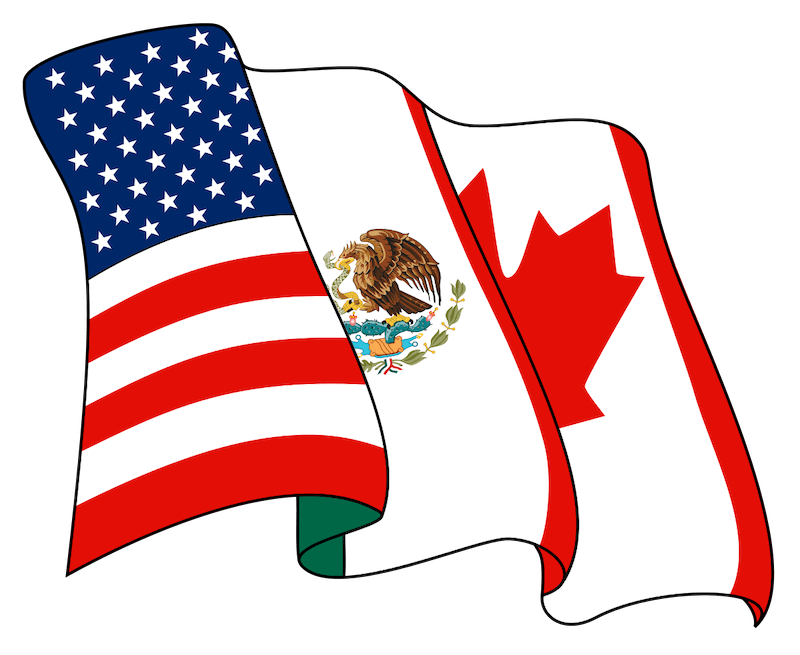A phone call by President Trump to the President of Ukraine has led to partisan warfare that could make the ugliest moments of the Mueller Probe seem like congenial interactions. I don’t dare guess how this latest drama will continue to unfold, but another attempt to start impeachment proceedings has a dangerous and unintended consequence that Congress should address immediately. All of this attention to impeachment is directly endangering the passage of the United States-Mexico-Canada-Accord (USMCA). Dubbed the “new NAFTA” (North American Free Trade Agreement) by many pundits, it is a lot more than NAFTA in all the right ways.
The urgency arises from the reality that we must pass the USMCA now while we have momentum and a hard-fought consensus between the U.S., Mexico, and Canada. Losing this opportunity and maintaining the status quo would be a windfall for crony corporatist lobbyists and a blow to working families in all three countries. The USMCA goes a long way towards positioning the United States to be more competitive in the 21st-century economy by empowering workers, helping small businesses, recognizing that we must adapt trade for a digital economy, and by impressively increasing labor conditions, and heightened environmental regulations. The USMCA was intensively and exhaustively negotiated between the three countries. Further delay will likely kill it and preserve the NAFTA status quo for a long time.
I strongly believe in free trade, and the benefits of open access for buyers and sellers, but NAFTA was never really a free trade agreement. NAFTA is the political economy version of a laboratory experiment that went berserk. Sadly, this was no contained lab experiment, it was a real agreement that engineered a catastrophe for millions of working-class and middle-class families all over the North American continent. NAFTA really is as bad as described by Democrats and Republicans alike.
 The outrage is well justified. NAFTA led to the elimination of more than 700,000 US jobs in manufacturing. Another staggering but lesser-known fact is that NAFTA also hurt the Mexican economy, Mexican workers on average earn less money now than before NAFTA was implemented. The poverty rate in Mexico is three points higher now than when NAFTA was passed. Since its adoption, NAFTA has produced $2 trillion in trade deficits for the United States. Let’s examine the sobering practical effects of these trade deficits by considering that over 800,000 US workers have qualified for Trade Adjustment Assistance because they lost their jobs from NAFTA related activity.
The outrage is well justified. NAFTA led to the elimination of more than 700,000 US jobs in manufacturing. Another staggering but lesser-known fact is that NAFTA also hurt the Mexican economy, Mexican workers on average earn less money now than before NAFTA was implemented. The poverty rate in Mexico is three points higher now than when NAFTA was passed. Since its adoption, NAFTA has produced $2 trillion in trade deficits for the United States. Let’s examine the sobering practical effects of these trade deficits by considering that over 800,000 US workers have qualified for Trade Adjustment Assistance because they lost their jobs from NAFTA related activity.
Another reason that Congress must act with urgency is that NAFTA caused real wages in the United States to decline drastically. NAFTA allowed companies to keep wages down and gave them enormous leverage over labor unions by simply threatening to move their companies to Canada or Mexico overnight.
States from coast to coast have suffered enormously under this ill-conceived trade agreement. For example, here in New York small businesses don’t have the necessary protections or access to Canadian and Mexican markets that would help them flourish. New York’s agriculture industry is hurt by NAFTA. The obliteration of manufacturing in New York caused by NAFTA threatens the emergence of new technologies and innovation that are vital not only to the New York City economy but to an economic resurgence in Upstate New York as well.
Ratification of the USMC will be good for the U.S. economy. The International Trade Commission estimates that the USMCA will create close to 200,000 jobs in the United States. In addition to boosting domestic automobile production with about 20,000 new jobs, car companies will have zero tariffs for manufacturing, if 75% of car components come from the United States, Canada, or Mexico.
USMCA provides for a $16 minimum wage for employees in the auto industry which will disincentivize automakers from the all too familiar practice of being able to move production from one country to another almost overnight. U.S. dairy farmers will have more access to Canadian markets. Intellectual property protections are also boosted. The USMCA also strengthens collective bargaining rights of unions in Mexico. Unlike NAFTA, the USMCA provides real enforcement mechanisms for hard-fought labor and environmental standards.
The USMCA includes support for e-commerce, while NAFTA doesn’t even mention the internet. The Business Council of New York State Inc. sent a letter to New York’s entire Congressional Delegation urging the ratification of the USMCA. The letter was signed by 55 major companies and organizations doing business in New York State.
After intense negotiations, the governments of Canada, Mexico, and the United States were able to come to an agreement for replacing NAFTA and approving the USMCA. The Senate in Mexico has already passed the USMCA by an overwhelming margin. Canada is poised to follow suit if we don’t get wobbly. We must pass the USMCA for the benefit of millions of US families and in order to start a continental healing process from the NAFTA disaster.
Fascination with impeachment is no excuse for any politician to delay and vacillate thereby allowing for the NAFTA status quo to continue harming American families. I encourage Speaker Nancy Pelosi to set aside the internecine party conflict for at least one day and put the USMCA to a vote that is sure to pass.
Nicholas Chamberas has advised good government advocacy groups, elected officials, and political candidates on public policy matters as well as having served as a senior adviser to several prominent campaigns. He holds degrees in Political Science and Law.










